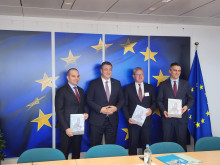The Deputy Prime Minister and Minister of Transport and Communications, Grozdan Karadjov, participated in a meeting in Brussels dedicated to the development of three strategic transport corridors between Bulgaria, Greece, and Romania. Together with the European Commissioner for Sustainable Transport and Tourism, Apostolos Tzitzikostas, the Minister of Infrastructure and Transport of Greece, Christos Dimas, and the State Secretary of the Romanian Ministry of Transport, Ionuț Savoiu, Minister Karadjov discussed future connections between the Aegean Sea, the Black Sea, and the Danube River through joint road and rail projects. This transport axis holds tremendous potential for economic growth in each of our countries, as well as for improved mobility and accelerated regional development. The meeting continued discussions that began earlier in March between Commissioner Tzitzikostas and Deputy Prime Minister Karadjov.
"We are initiating an important trilateral dialogue between Bulgaria, Romania, and Greece, which will serve as the as the foundation for implementing projects under the European Transport Corridor 'Baltic Sea – Black Sea – Aegean Sea'," stated Commissioner Tzitzikostas. He presented a draft memorandum of cooperation between the three countries. "The goal is to outline a roadmap and a clear action plan, including specific projects, and for the memorandum to be signed before the end of the year," the Commissioner further explained. According to him, the timing is particularly favorable, as the upcoming EU budget will prioritize cross-border components.
"Developing sufficient transport links between the Aegean Sea, the Black Sea, and the Danube River will contribute to the economic development of the regions, facilitate the swift transport of passengers and goods, and is of particular importance for military mobility," emphasised Grozdan Karadjov. He explained that the projects on Bulgarian territory include three directions – the sections Kulata-Vidin, Svilengrad-Ruse, and the future Black Sea highway. Bulgaria will propose that the agreement also includes new bridge locations across the Danube River.
The funding for these projects is expected to be secured through European Union funds from various EU mechanisms, and the countries will also seek other complementary financial sources. European Commissioner Tzitzikostas congratulated Bulgaria for its efforts in fostering public-private partnerships, through which additional investments will be attracted for critical infrastructure projects.




